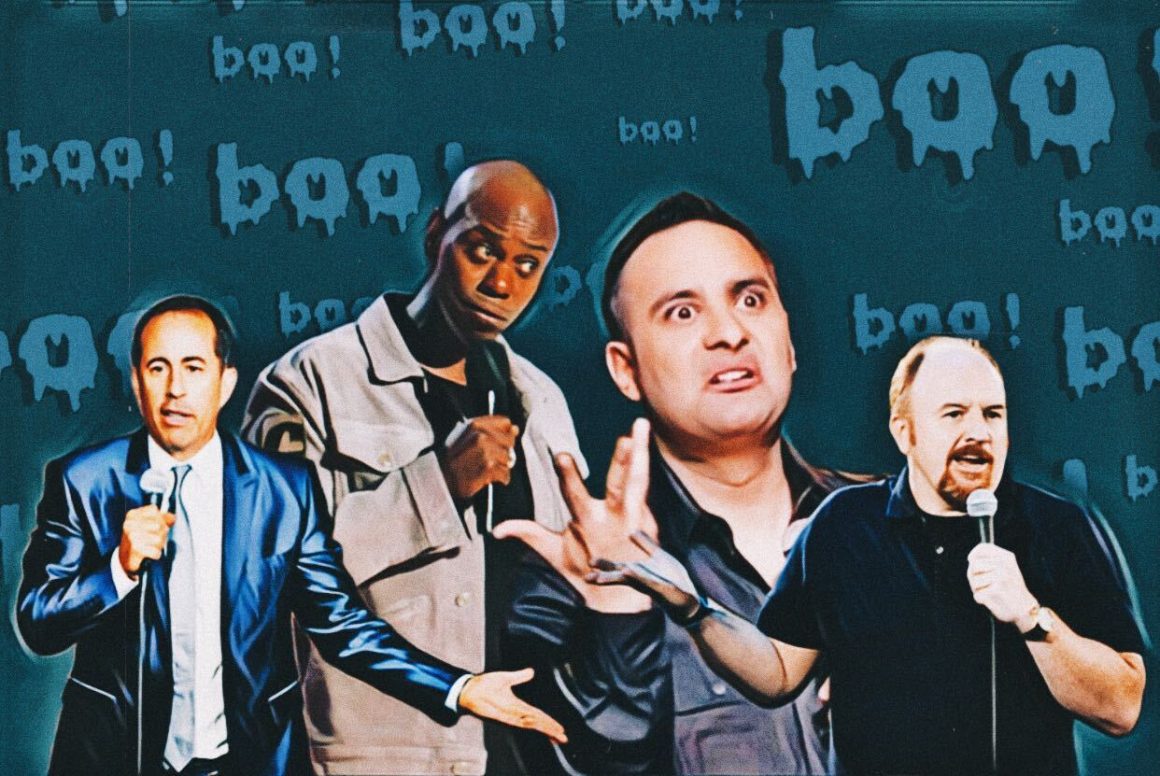
Viewing stand-up comedy as it should be — a service
By Aymen Sherwani, December 1 2022—
Dave Chappelle is up to his usual antics again — his latest not-so-comedic stunt? Saying that it’s “not crazy to think” that Jewish people control Hollywood on Saturday Night Live (SNL). As the comedian doubles down on his statements against the transgender community and now alludes to his not-so-quiet support of Kanye West’s anti-Semitic remarks, one really questions when older comedians stop complaining about the world becoming less tolerant towards their implicit encouragement of hate. When Chappelle first broke through into the limelight, he was featured in a montage of random people telling a joke in the first episode of ABC’s America’s Funniest People, airing on September 13, 1990. Since then, Chappelle has come forward as a trans-exclusionary radical feminist (TERF) and — as mentioned — has openly announced his implicit support for Kanye West’s statements about Jewish people.
Keyword: implicit. For many comedians, humour is their way of choosing a side and if a comedian’s stand-up routine is mostly centred around defending people who “say the quiet part out loud” or routinely singling out a certain group then it’s more than a joke. Now, it’s using one’s platform to enable harmful stereotypes like historically anti-Semitic conspiracy theories or the notion that transgender people aren’t valid — all while having the ability to say “oh, it was just a joke, I can’t believe this new generation is so sensitive.” In that respect, comedy is more an exercise of cowardice — to make jokes on truthful premises, harmful stereotypes that actually impact people on a day-to-day basis and to be able to cower behind your job title when you inevitably face the consequences.
Such a statement has come out of the mouths of many a comedian of yesteryear, not limited to Chappelle. Jerry Seinfeld, Louis C.K., Kevin Hart, Aziz Ansari and so many more have repeated the same old complaint of how “cancel culture” has damaged their careers. Here’s a piece of advice — you’re not getting any funnier by complaining that no one finds your implicit encouragement of hatred to be funny anymore.
In the past, Louis C.K. has joked about Asian men having small penises because “they’re all women” and that nonbinary people are invalid, saying that “you should address me as ‘there,’ because I identify as a location” — then having the audacity to complain about being called out. C.K. can argue that his jokes are simply jokes all he likes, but he’s counting on the fact that the audience will laugh because Asian men are already widely stereotyped as effeminate and his audience doesn’t respect changing notions of gender identity — in a way, he’s actually subtly signalling that he agrees.
Stand-up comedy has also been traditionally occupied by men — whether it be on the stage or in the audience — because women, people of colour and LGBTQ+ people aren’t supposed to make jokes, they’re supposed to be the jokes. Unless — and only unless — they make jokes at the expense of their own communities, and when it gets to that point, you’re just a mouthpiece for the ideas of a straight, White man. Those comedians are only funny because they’re one of the “chill ones” that can make a joke about themselves, but then the communities they’re from face the consequences.
“Somebody gonna get hurt real bad,” says Russell Peters — not once, not twice, but almost every time he’s been onstage since jokes about parents abusing their children have been normalized.
The way that non-South Asian people have made jokes, asking me if I get beat by my parents at home and donning that horrible accent and bobbling their heads a la Peters style is something that borders more towards ridicule than it does towards humour. When you don’t find them funny, suddenly it’s your fault you’re not one of the aforementioned “chill ones” that can laugh at misconceptions about their community. I have never been beaten in my life — and yet — for some reason, comedians like Peters continue to perpetuate the idea that South Asian parents lack the ability to be nurturing.
Free speech is free speech and everyone has the right to say whatever they would like, but people also have the freedom to disengage with your content and freely express their discontent — you should be able to adapt or deal with that. Stand-up comedy just isn’t funny anymore and it’s because washed-out comedians routinely complain about how they did not move with the times and that they are considered more offensive than they are funny now. But isn’t the mark of a successful professional their ability to adapt as their industry changes? It’s strange how comedians blame their target market for their own failures to successfully resonate with them — the only industry where its workers are legitimately offended when they’re criticized for providing a poor-quality service and are, therefore, not profitable.
When you look at it that way, comedians have been counting on their audiences to harbour internalized misogyny, racism and homophobia for decades. They’re hoping to make money through humorous shock factors for people that are scared to vocalize their own hate, garnering more support for simply “saying it like it is.” So what exactly are they mad about when they’re called out? Shall I be the one to say the quiet part out loud now?
This article is a part of our Voices section and does not necessarily reflect the views of the Gauntlet editorial board.
